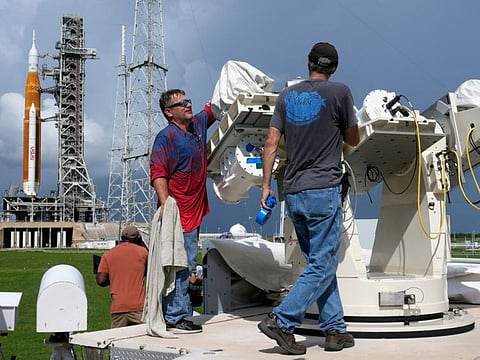Nasa’s Artemis I launch attempt scrubbed for second time in week
Hydrogen leak in engine cavity prevents engineers from fully loading liquid into rocket

Washington: Nasa called off Saturday’s launch attempt for the much-anticipated mission to send a rocket around the moon, marking the second time within a week that engineers decided to scrub the flight due to mechanical issues.
The scrapped launch followed a hydrogen leak in the engine cavity, which prevented Nasa engineers from fully loading liquid hydrogen into the rocket. The issue will need to be resolved before Nasa’s Artemis I mission can lift off. A similar leak was one of several issues that contributed to the space agency’s decision to postpone an attempt on August 29.
The mission, called Artemis I, is the initial step in NASA’s ambitious plan to send the first woman and the first person of color to the surface of the moon as early as 2025. The goal is to prove the new Space Launch System can send an uncrewed capsule called Orion into lunar orbit, before Nasa feels comfortable putting astronauts on board.
After Saturday’s scrub, Nasa didn’t immediate specify a date for the next launch attempt. The earliest opportunity is Monday Sept. 5.
“Please understand, it’s a test flight,” Bill Nelson, Nasa’s administrator, said in an interview before the first aborted launch attempt on Monday. “They stress it and test it in a way that you’d never do with humans on board. That’s the point of a test flight.”
Saturday’s launch attempt was more than a decade in the making. First conceived in 2010, the SLS was originally projected to launch as early as 2017. But its development has been long delayed, with its budget ballooning the longer the rocket has stayed on the ground. The rocket’s development cost has soared from an original $7 billion to about $23 billion, according to an estimate by the Planetary Society.
Over time audits had highlighted issues at the prime contractors - Boeing Co. for the SLS and Lockheed Martin Corp. for the Orion capsule - as well as testing and construction mishaps.
Nasa played down the development struggles as the original launch date approached. “We are developing new systems and new technologies,” Nelson said during a press conference ahead of Monday’s scrubbed attempt.t “And it takes money and it takes time.”
The Monday morning attempt was scrubbed one minute after the start of its launch window following a night of weather delays and glitches with the rocket’s equipment.
Artemis I, when it does launch, will send an uncrewed Orion capsule into orbit around the moon. The capsule will carry a combination of mannequins and other science and technology payloads, tasked with inserting itself into a distant lunar orbit before returning to Earth and splashing down in the Pacific Ocean after a 37-day mission.



